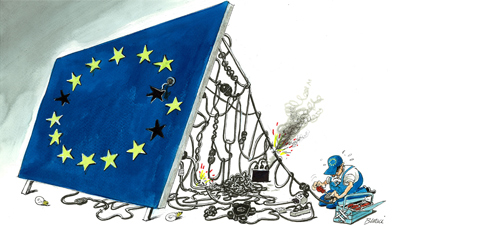Forecasting Europe’s increasing irrelevance in the world has become as popular a continental sport as making fun of blunders in Brussels. In just a few decades, Europe’s share of the world economy will shrink from 20% today to well below 10%. And the European Union’s decisions leave much to be desired. My visits to Brussels have borne out my feeling that, in our day, the European project seems more of a government jobs scheme for the continent’s middle classes than an ideal that will generate hope and energise the region.
The inability to cope effectively with the economic crisis is just a symptom of a deeper problem of leadership. Why is it that Europe has suffered the most painful and prolonged consequences of the global crash? The Irish crisis has bred even more pessimism. Gideon Rachman, for example, writes in the Financial Times: "My current best guess is that the single currency will indeed eventually break up – and that the euro’s executioner will be Germany, the most powerful country and economy inside the European Union.”
His argument is that the string of financial crises will eventually wear out the patience of the Germans, who will end up thinking they’ve done – and paid for – everything they could, but “the other Europeans won’t do what is necessary to save themselves”. Germany, he says, “might then feel released from its historic obligation to ‘build Europe’”.
Unjust redistribution of wealth tolerated in the United States
Naturally, the collapse of the European monetary system could well deal a crippling blow to the project of European unity. That would obviously be bad for Europe. What is less obvious is that a world without an influential, integrated Europe would be worse for everyone. The values and examples Europe imparts to the world are superior to those coming from anywhere else. But Europe’s economic and political decline now undermines the force of that positive influence.
The repudiation of war that prevails here in the aftermath of the two horrifying 20th-century conflicts is derided by those who confuse pacifism with weakness. But better a world with a regional power willing to make some mistakes to avoid war than one in which powerful countries have no qualms about making the mistake of starting “pre-emptive wars”. If the government of your country begins violating human rights, torturing, “disappearing” opponents and imprisoning journalists, who would you rather see leading the international community? The Chinese Communist Party? Putin’s Russia? Or Europe?
While the most unjust redistribution of wealth in a century is tolerated in the United States and nouveaux riches amassing inconceivable fortunes are celebrated in Russia and China, Europe remains highly allergic to inequality. Which do you prefer: a world in which 1% of the population holds 95% of the wealth, and the poor and excluded masses fight it out for the rest, or a world dominated by an up-and-coming politically powerful middle class?
Whole world will suffer if Europe fails
Europe represents the second scenario. We know the European social model is the best in the world, though we also know it is not viable in many countries. But a model in which millions of people are deprived of adequate health care, or left defenceless when they lose their jobs or grow old, is not sustainable either, nor is it worthy of emulation. European development aid for the poorest countries tends to be ineffective. But no-one is more generous and supportive towards the neediest than Europeans.
Globalisation is spreading, aggravating problems that require coordinated multinational responses. The European experiment in collective government is the most ambitious ever attempted by mankind. Its failure would induce many to discard the idea and refrain from attempting anything like it for some time to come. And losing that time is a luxury we can’t afford.
I don’t know whether the European integration project will get past the enormous obstacles facing it. But I do know the whole world will suffer if it fails.
Translated from the Spanish by Eric Rosencrantz
Was this article useful? If so we are delighted!
It is freely available because we believe that the right to free and independent information is essential for democracy. But this right is not guaranteed forever, and independence comes at a cost. We need your support in order to continue publishing independent, multilingual news for all Europeans.
Discover our subscription offers and their exclusive benefits and become a member of our community now!












